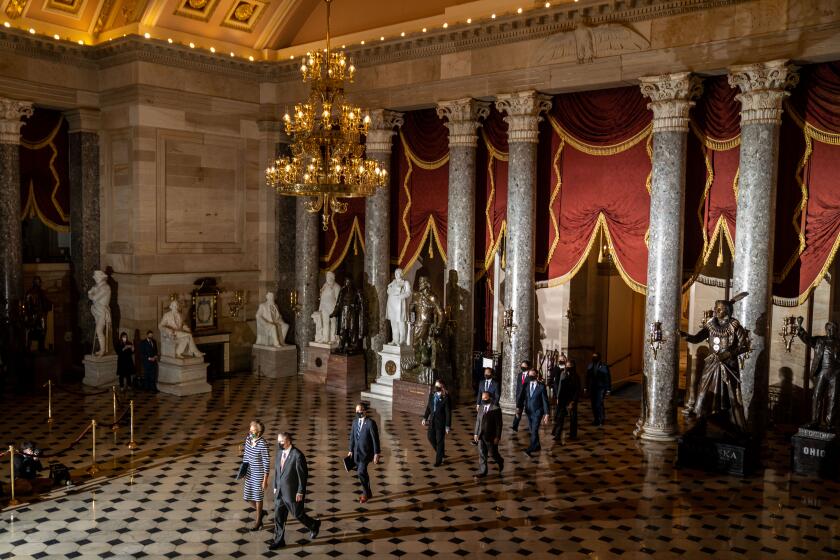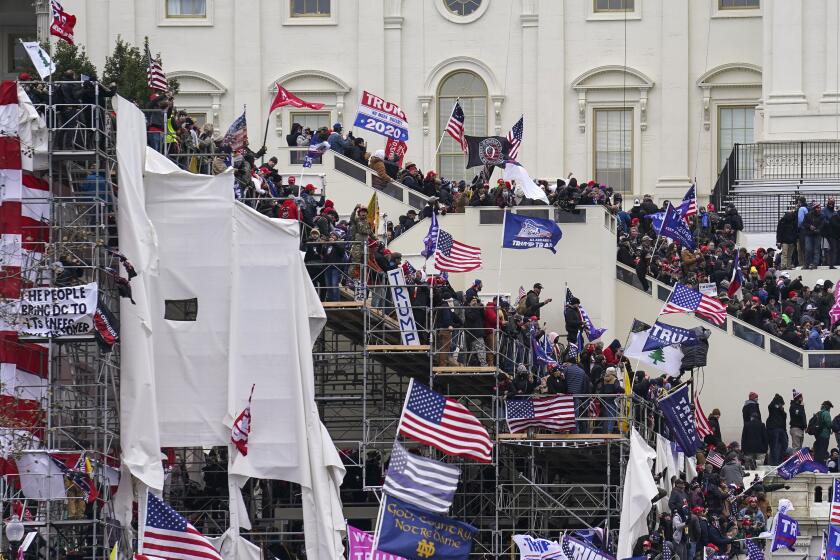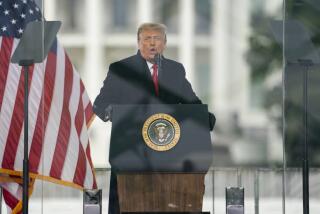Trump impeachment lawyers blast ‘brazen political act’ as Senate lays out trial agenda

- Share via
WASHINGTON — Lawyers for former President Trump criticized the impeachment case against him as “political theater” in their final brief before the beginning of the Senate trial Tuesday.
In the 78-page brief filed Monday, Trump’s lawyers David Schoen and Bruce Castor argued that the case is unconstitutional because Trump is no longer in office, and therefore, it must be dismissed.
“The article of impeachment presented by the House is unconstitutional for a variety of reasons, any of which alone would be grounds for immediate dismissal,” the attorneys wrote in the brief. “Taken together, they demonstrate conclusively that indulging House Democrats hunger for this political theater is a danger to our republic democracy and the rights that we hold dear.”
Trump’s legal team says he won’t testify at his Senate impeachment trial despite a request from House Democrats.
Because Trump is no longer in office, they argue, he cannot be removed through conviction — the primary penalty provided in the Constitution. They also assert that the allegations raised by the House fail to meet the standard of a crime and that the president’s speech was protected by the 1st Amendment.
The House voted to impeach Trump on a single article of inciting insurrection Jan. 13, one week after a mob overran the U.S. Capitol for several hours, resulting in five deaths, including that of a police officer, and delaying Congress from a ceremonial counting of the electoral college results.
For months Trump had falsely claimed that the 2020 election was stolen from him, even as dozens of lawsuits across the country were dismissed for lack of evidence or proof. Trump gave a speech to a crowd near the White House shortly before the riot, urging them to march to the Capitol.
House impeachment managers rejected Schoen and Castor’s calls to dismiss the case in a brief Monday, stating that Trump “willfully incited violent insurrection” to disrupt the peaceful transfer of power, an act they call “the most grievous constitutional crime ever committed by a president.”
Senate Majority Leader Charles E. Schumer (D-N.Y.) laid out the contours of the trial Monday.
The trial will begin Tuesday with up to four hours of debate and a vote about whether the process itself is constitutional. Democrats are likely to win that vote based on their narrow majority. After that, there will be four days of arguments, beginning Wednesday at noon ET with House managers.
The trial will adjourn Friday evening at the request of one of Trump’s lawyers and will resume Sunday afternoon. After both sides present their cases, senators will hear arguments for and against hearing from witnesses and obtaining documents. If they vote to allow witnesses or new documents, the trial will pause while witnesses are subpoenaed and deposed and documents are obtained. If not, senators will get several hours to question each side before hearing closing arguments. Senators will have time to deliberate before a final vote of whether to convict or acquit.
This week’s impeachment trial will shape Donald Trump’s legacy but probably not resolve the sharp divide over how to view the former president.
House managers and many constitutional and legal scholars defend the legitimacy of the trial, noting that the Constitution is silent on whether the Senate has the authority to levy penalties against former officials.
But Trump’s lawyers use the same reasoning, stating that the Senate cannot hold the trial because the Constitution does not explicitly allow it to convict former officeholders.
“The framers could have explicitly included a provision allowing for the impeachment of a former president, but they did not,” they state.
House prosecutors have emphasized the historical use of impeachment in Britain and the American colonies to argue that the founding fathers meant impeachment trials to include officials who had left office.
“Presidents swear a sacred oath that binds them from their first day in office through their very last. There is no ‘January Exception’ to the Constitution that allows presidents to abuse power in their final days without accountability,” the managers wrote.
Last month, all but five Republican senators indicated that they considered the trial unconstitutional because Trump was no longer in office, a move that demonstrates how difficult it will be for House managers to persuade 17 Republicans to join them in impeachment. A two-thirds vote is required for conviction.
Sen. Bill Cassidy (R-La.) cautioned Sunday on NBC’s “Meet the Press” that senators were put on the spot, and the vote was called with little chance to research the prevailing opinions of constitutional experts.
“It was a vote in a moment of time. And so, based upon what senators knew at that point and felt at that point, they then voted,” he said.
Several other Republican senators have voiced similar opinions about that vote, called by Sen. Rand Paul (R-Ky.), saying it occurred moments after they heard a one-sided presentation.
Get our L.A. Times Politics newsletter
The latest news, analysis and insights from our politics team.
You may occasionally receive promotional content from the Los Angeles Times.
Much of the brief from Trump’s lawyers focuses on technical or procedural aspects of impeachment. They say the House moved so rapidly, and without hearings or depositions, that Trump wasn’t given due process to defend himself before the charges were brought to the Senate. They accuse Democrats of attempting to “silence a political opponent and a minority party” through a “brazen political act.”
Trump declined an invitation to testify under oath, before or during the trial.
In their response, House managers also rejected the argument by Trump’s lawyers that the former president was voicing an opinion protected by the 1st Amendment when he repeatedly claimed that the election was being stolen.
“The House did not impeach President Trump because he expressed an unpopular political opinion. It impeached him because he willfully incited violent insurrection against the government. We live in a nation governed by the rule of law, not mob violence incited by presidents who cannot accept their own electoral defeat,” the managers wrote.
More to Read
Get the L.A. Times Politics newsletter
Deeply reported insights into legislation, politics and policy from Sacramento, Washington and beyond. In your inbox three times per week.
You may occasionally receive promotional content from the Los Angeles Times.













